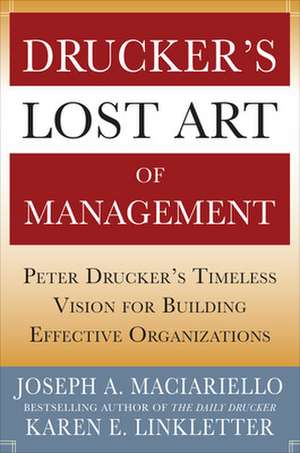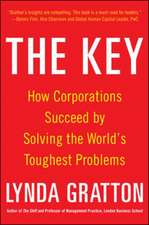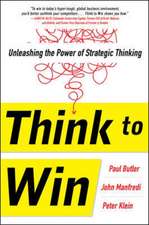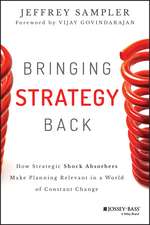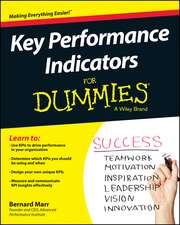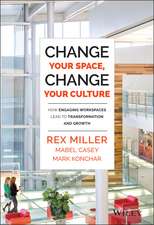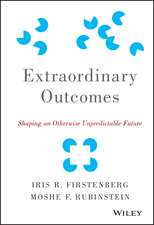Drucker’s Lost Art of Management: Peter Drucker’s Timeless Vision for Building Effective Organizations
Autor Joseph Maciariello, Karen Linkletteren Limba Engleză Hardback – 16 apr 2011
"Maciariello and Linkletter provide a very thoughtful and challenging journey in understanding Drucker's profound insights into the meaning of management as a liberal art."
—C. William Pollard, Chairman Emeritus, The ServiceMaster Company
"Linkletter and Maciariello have done a masterful job in bringing into focus the connections between Drucker's visions of management as a liberal art, of leadership dominated by integrity, high moral values, a focus on developing people, an emphasis on performance and results, and on balancing stability and continuity vs. the discontinuities created by change."
—Kenneth G. Wilson, Nobel Laureate in Physics 1982, 20-year disciple of Drucker's writings
"Maciariello and Linkletter provide a must-read for a new class of managers and academics who see beyond the bottom line."
—David W. Miller, Ph.D., Director Princeton Faith & Work Initiative and Associate Research Scholar, Princeton University, and President, The Avodah Institute
About the Book:
While corporate malfeasance was once considered the exception, the American public is increasingly viewing unethical, immoral, and even criminal business behavior as the norm. According to the authors of Drucker's Lost Art of Management, there is some truth behind this new perception. Business management has lost its bearings, and the authors look to Peter Drucker’s vision of management as a liberal art to steer business back on course.
Recognized as the world's leading Drucker scholar, Joseph Maciariello, along with fellow Drucker scholar Karen Linkletter, provides a blueprint for making corporate American management more functional and redeeming its reputation. Throughout his career, Peter Drucker made clear connections between the liberal arts and effective management, but he passed away before providing a detailed exposition of his ideas. Maciariello and Linkletter integrate their Drucker expertise in management and the liberal arts to finally define management as a liberal art and fulfill Drucker's vision.
In Drucker's Lost Art of Management, Maciariello and Linkletter examine Drucker's contention that managers must concern themselves with the foundational concepts of political science, history, economic theory, and other liberal arts, such as:
- Societal values and standards
- The use and abuse of power
- Individual character development
- Innovation and technology
- The nature of good and evil
- The role managers play in a healthy society
Our future executives, professionals, managers, and entrepreneurs are on track to learning (and perpetuating) the idea that only the bottom line matters in business--a concept that benefits no one in the end. It's up to us to instill the ageless verities that make for good management, good society, and good business results.
A passionate call for radical change in today's management practices, Drucker's Lost Art of Management provides the ideas, concepts, and practical advice to make that change happen before it's too late.
Preț: 357.21 lei
Nou
Puncte Express: 536
Preț estimativ în valută:
68.36€ • 71.11$ • 56.44£
68.36€ • 71.11$ • 56.44£
Carte disponibilă
Livrare economică 24 martie-07 aprilie
Preluare comenzi: 021 569.72.76
Specificații
ISBN-13: 9780071765817
ISBN-10: 0071765816
Pagini: 464
Dimensiuni: 163 x 239 x 34 mm
Greutate: 0.79 kg
Editura: McGraw Hill Education
Colecția McGraw-Hill
Locul publicării:United States
ISBN-10: 0071765816
Pagini: 464
Dimensiuni: 163 x 239 x 34 mm
Greutate: 0.79 kg
Editura: McGraw Hill Education
Colecția McGraw-Hill
Locul publicării:United States
Cuprins
Introduction; Chapter 1: Origins of Management as a Liberal Art in Peter Drucker's Writings; Chapter 2: Management and Liberal Arts Traditions: Bridging the Two Worlds; Chapter 3: Contributions of Management as a Liberal Art; Chapter 4: Federalism and the Distribution of Power and Authority; Chapter 5: The Human Dimension and Management as a Liberal Art; Chapter 6: Effective Leadership as a Liberal Art; Chapter 7: Social Ecology and the Practice of Management as a Liberal Art; Chapter 8: Applied Social Ecology: Innovation and Change for a Hopeful and Bearable Society; Conclusion
